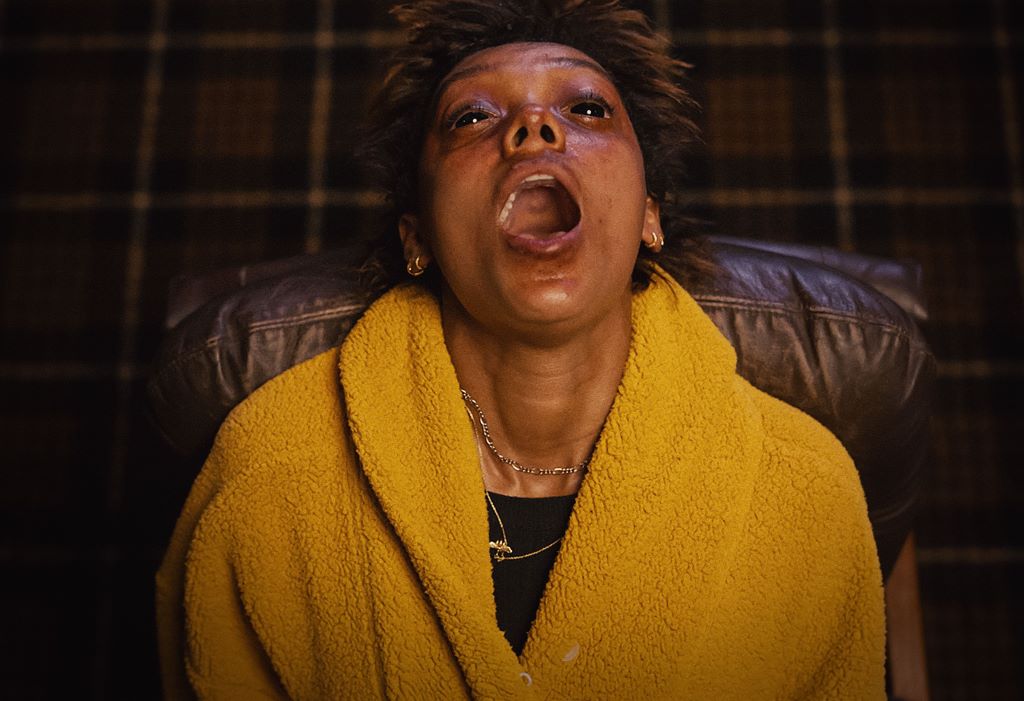Reviews include M3GAN 2.0, Familiar Touch, and I’m Your Venus.
TFCA Friday: Week of July 28
July 28, 2023

Welcome to TFCA Friday, a weekly round-up of film reviews and articles by TFCA members.
In Release this Week
The Beanie Bubble (dir. Kristin Gore and Damian Kulash)
“Rather than creating intrigue and deepening context, the non-linear format simply creates confusion. By the time we reach the Love Actually-esque conclusion that attempts to bring everything together in a series of ah-ha! moments, the storytelling schtick feels worn out,” notes Rachel Ho at Exclaim!. “What frustrates this aspect of the film even more is that it’s very unnecessary. The story of Beanie Babies has a compelling angle that gets buried beneath some swishy filmmaking that swishes too much and becomes a distraction.”
For the Animals (dir. Sadhvi Siddhali Shree and Sadhvi Anubhuti)
“The ‘catastrophic’ stray crisis isn’t used as a hammer over our heads, the approach of documentarians Sadhvi Siddhali Shree and Sadhvi Anubhuti is direct, businesslike, not sensationalised or sentimentalised. It’s a learning experience, with great rewards, and promotes the simple solution that even one person can make a difference. Alyssa Milano executive produces this most worthy film,” notes Anne Brodie at What She Said.
Haunted Mansion (dir. Justin Simien)
“Simien is no doubt a talented storyteller – his work on Dear White People, both the film and Netflix series, is evidence enough. But his vision here is clouded by corporate obligations and a woefully weak script by Katie Dippold, who herself is much funnier in every one of her other projects (including Parks and Recreation, The Heat and the 2016 Ghostbusters reboot),” notes Barry Hertz at The Globe and Mail. “The film’s core problems are amplified by a curiously assembled cast that never gels. The somnambulant Stanfield is the prime offender, but Dawson, a quick-appearing Jamie Lee Curtis (taking over from Jennifer Tilly’s role in the 2003 film), and even the typically reliable Haddish are almost just as flat.”
“The latest version of The Haunted Mansion, opening this week from director Justin Simien (Dear White People), plays like a movie made by a fan of the theme park ride. It carries an understanding that an apparition you see in the mirror is more frightening than one standing in front of you. Ghosts come and go, some comical, some malevolent, some way more malevolent than the one before,” counters Jim Slotek at Original Cin. “It has the cast to carry off the more obvious gags and punchlines, including Owen Wilson as a fraudulent minister/exorcist, Tiffany Haddish as an equally dubious voodoo queen and Danny DeVito as a crackpot professor of the paranormal.”
“Haunted Mansion mostly nails the vibe I’m looking for from a PG-13 haunted house movie. The film is spooky and atmospheric, with an eerie score. Darren Gilford’s creaky and decrepit production design brings the set to life in vivid detail,” says Victor Stiff at That Shelf. “Haunted Mansion’s New Orleans setting is the perfect location for a haunting movie. But despite some lip service to America’s most haunted city early on, this story could have taken place anywhere. It’s unfortunate the film didn’t better integrate New Orleans’ culture and folklore into the story’s ghoulish mythology.”
Heaven Stood Still: The Incarnations of Willy DeVille (dir. Larry Locke)
“It’s sincere but basic,” admits Liam Lacey at Original Cin. “There’s an assemblage of archival clips tracking the chronology of a three-decade career, bolstered by the testimony of his musical colleagues. They say that he was unappreciated as a songwriter, a versatile musical stylist who moved confidently from Brill Building teen pop, rural blues, French cabaret and New Orleans rhythm and blues.”
KOKOMO CITY (dir. D. Smith)
“Smith has crafted a powerful artistic film. Shot in black and white, it has a beauty to it that is rare in street-wise documentaries,” writes Marc Glassman at POV Magazine. “The film’s imagery is stark, focusing mainly on the transgender sex workers’ bodies and bedrooms, but with surprising cutaways to dancers, athletes and, in one memorable scene, a gradually animated flower. The argument is raised that being trans is empowering, giving the person some of the best qualities of males and females. It’s a transgressive thought on being a trans person.”
“Although the subject matter might be niche and unconventional for some viewers, it remains compelling and thought-provoking,” observes Gilbert Seah at Afro Toronto.
“Kokomo City is a vibrant, original work, shot in black and white, in a kaleidoscopic blend of monologues, conversations, and re-enactments. At a moment when the American right are obsessed with criminalizing health care for transgender people and erasing Black history, it’s also timely,” declares Liam Lacey at Original Cin. “They talk to the camera in ways that are perceptive, funny, and not remotely politically correct. Each of them explains how they entered the business to support themselves or their families when few other options were available and offer their critiques of social attitudes around sex and race.”
At POV Magazine, Pat Mullen speaks with D. Smith about finding an authentic representation for trans experiences. “Authentic storytelling…just is at a low. It’s all b.s. Some of the most popular trans girls are still struggling and still doing sex work,” says Smith. “They don’t want to leak that idea to people because they feel obligated to be the happy-go-lucky, ‘I got it together, bitch. I made it and I’m here.’ Just because you go on the red carpet and tell the truth doesn’t mean that you are a party pooper. We cannot be helped if people think we’re fine because we look like goddesses all the time. Where’s the truth? The absolute truth, the true experience of Black transgenderism is absolutely not being represented. We’re still in this place where we wanna make people feel comfortable. No matter what, everyone wants to feel validated. I don’t care what anyone says. That’s part of being human.”
The Lady of Silence: The Mataviejetas Murders (dir. María José Cuevas)
At Afro Toronto, Gilbert Seah says the film “plays like a taut suspense documentary full of cinematic pleasures that finally satisfy the audience’s curiosity on serial killers and this one’s particular capture.”
The Murderer (dir. Wisit Sasanatieng)
“[A] very silly yet brilliant blend of slasher horror and wacky comedy (from Thailand) with rarely a dull moment that will definitely impress horror fans and put its Thai director on the filmmaking map,” notes Gilbert Seah at Afro Toronto.
North of Normal (dir. Carly Stone 🇨🇦)
“Carly Stone’s tough, loving, and emotionally challenging North of Normal, based on author Cea Sunrise Person’s experiences as a child born into an off-grid Yukon commune, is a profoundly resonant portrait of the mother-child bond over some twenty years,” writes Anne Brodie at What She Said. “Given beautifully nuanced performances, a vivid memory timeline, and visceral emotion, North of Normal feels genius, deep and real.”
“River Price-Maenpaa and Amanda Fix who play Cea as child and teenager, deliver exuberant and credible performances in an otherwise charming and realistic film of the strength of family bonding,” says Gilbert Seah at Afro Toronto.
“Played as a child by River Price-Maenpaa and as a teen by Amanda Fix, both outstanding, Cea sees modeling as her escape though one can only imagine how that occupation in a pre #MeToo world might have further messed with her head. Especially since Cea pursues it in Paris, far away from even the tangential financial and emotional support of Michelle and whomever Michelle is sleeping with at the time,” says Kim Hughes at Original Cin. “North of Normal is gifted with strong and committed performances, and director Stone lingers on her main characters’ faces, allowing them full expression. By contrast, Michelle’s revolving series of lovers — who range from selfish and adulterous to predatory — are captured in less flattering angles. It’s a simple technique but an effective one.”
At Exclaim!, Rachel Ho chats with star Sarah Gadon and learns how the actor embraced the messiness of her character. “I don’t necessarily think that we always have to have empathy for characters who make bad decisions,” says Gadon. “But part of my process is understanding the psychology of the character and what gets them to their state of being. I was able to really humanize her and bring the humanity out in the circumstances where you would just normally be really appalled by what she was doing to her kids or how she was raising them.”
Paradise (dir. Boris Kunz, Tomas Jonsgården and Indre Juskute)
“Paradise feels less like a sci-fi thriller, assuming that is what it is aimed at, because the film spends too much details to make it credible as well as a complete world. To the latter effect, Paradise succeeds,” concedes Gilbert Seah at Afro Toronto.
Talk to Me (dir. Danny Philippou and Michael Philippou)
“The young and mostly unknown cast is terrific, especially Sophie Wilde as Mia and Joe Bird as Riley, two Adelaide teens among many who participate in the handshake ritual, which has gone viral thanks to social media,” writes Peter Howell at the Toronto Star. “The recklessness of this pursuit is made plain in the ghastly and cautionary prologue, in which blood gushes after an older brother attempts to rescue his possessed younger bro. The gory intervention happens at a crowded and noisy party, captured in a tracking shot by skilled cinematographer Aaron McLisky and by callous onlooking Instagrammers and TikTokers. Gen Z really does love to watch.”
“Talk to Me features a ceramic hand—a conduit to the spirit world, scrawled with warnings and signatures like the bathroom wall of a severely tagged punk-bar. The movie takes a leap of faith accepting the hand as a tool in a parlour game with the ability to connect to lost souls,” notes Thom Ernst at Original Cin. “There is no room for disbelief. Either you’re in for the ride or you’re not—and if you’re not, then step out of the way because Talk to Me will steamroll over any doubters… Credit goes to the Philippou brothers for their originality and perfectly queasily executed bits of ghoulish anarchy.”
At Afro Toronto, Gilbert Seah calls it “scary but derivative horror from down under.”
“[A]ll hell breaks loose, in both metaphorical and literal form. And it is when less inspired filmmakers might resort to pulling out the usual bag of horror tricks, including jump scares, dark lighting and copious gore,” says Barry Hertz at The Globe and Mail. “Yet the Philippou brothers are pushing for something different here, employing a battery of fright moves that are slicky sick and impressively demented. What the pair do to poor young Riley in particular – his body becoming an unwitting vessel for Mia’s otherworldly transgressions – will give horror fans the best and most unshakable kind of nightmares.”
Unknown: Cosmic Time Machine (dir. Shai Gal)
“Amazing, mind-boggling and incredible!” exclaims Gilbert Seah at Afro Toronto. With the telescope’s search for life, the way humans understand the universe will dramatically be changed.”
File Under Miscellaneous: Barbenheimer Fallout
At The Globe and Mail, Barry Hertz reports that some moviegoers at Toronto Cineplex locations paid through the nose for hot tickets. Patrons in some locations were charged extra if they saw either film in the Barbenheimer bill, whereas other titles weren’t subjected to variable pricing. “We currently apply the additional charge for a number of weeks on select high-demand films,” Samantha Shecter, manager of communications at Cineplex, tells Hertz. “When determining ticket price, additional factors considered include the duration it will run and the anticipation of the film’s success. We do not include an upcharge on most films we show in our theatres.”
Also at The Globe and Mail, Hertz looks at what the success of Barbie and Oppenheimer means in the context of the strike and a presumably barren release calendar in the months ahead. “While any labour action is, at its heart, an example of it taking two sides to tango, the facts presented so far make it exceedingly easy to see the AMPTP’s dance card as one being scrawled in the blood of the creative class,” writes Hertz. “And now, by threatening to starve the 2023 release calendar of major new releases – the kind of big films that, as Barbenheimer has proved, can draw the large, eager and diverse crowds who were scared off during the pandemic – the studios and streamers are also punishing their partners in exhibition.”
At Original Cin, Liam Lacey explores the history of Barbie on film, including in Todd Haynes’ breakout film Superstar: The Karen Carpenter Story: “Almost all the parts are played by modified Barbie dolls, voiced by human actors. Doll-sized sets were used — even doll-sized boxes of laxatives — and Haynes whittled the face and arms of a doll to show Carpenter’s increasing thinness,” explains Lacey. “Partly a parody of a melodramatic documentary, and a commentary on how the rebellious rock and roll ’60s became the easy-listening ’70s, the film is both cruel and sympathetic in revealing Carpenter’s tragic decline.”
A Festival of Festival Coverage: TIFF Rolls Out the 👀s, Fantasia Frightens
At The Globe and Mail, Barry Hertz chats with TIFF CEO Cameron Bailey about the festival’s line-up that dropped this week, and features many big names amid speculation that the SAG-AFTRA strike in response to the AMPTP’s unwillingness to budge on their bargaining points, would affect the red carpets. “We’re meeting every day to work out the details and nuances. But the films that we invited are coming,” Bailey tells Hertz. “The first thing we did was check in with the owners of the films, and they’ve all confirmed. Not a single film has dropped out because of the labour action.”
At the Toronto Star, Peter Howell also chats with Bailey about programming while anticipation some shake-ups with the star power. “We’ve got lots of international films and talent that aren’t affected by (the strikes) … We’re just working through now how they might be affected, if at all, because they’re not from the companies that are being struck. So it’s in the details,” Bailey says to Howell. “We’re actually working this through on a film-by-film, sometimes actor-by-actor basis, just to get as much clarity as we can. But we think that we can certainly respect the labour action and what it calls for, while still putting on a great festival with lots of people in town.”
At the Alliance of Women Film Journalists, Liz Brau breaks down the line-up, including a good slate of films by women among the Galas and Special Presentations titles. “Among Special Presentations, highlights include a slew of films directed by women: La Chimera, from director Alice Rohrwacher about archeologists and the black market in historical artifacts; TIFF favourite Catherine Breillat’s controversial Last Summer with Lea Drucker and Samuel Kircher in a taboo love affair; North Star, a family drama directed and co-written and starring Kristen Scott Thomas, with Scarlett Johansson, Sienna Miller and Emily Beecham; Justine Triet’s crime thriller Anatomy of a Fall, the Palme d’Or winner at Cannes; and Chloe Robichaud’s Days Of Happiness, with Sophie Desmarais as a talented young conductor struggling with a complex relationship with her father/manager.”
At POV Magazine, Pat Mullen recaps the TIFF Docs line-up released this week, which has an emphasis on sales titles, including an epic food flick: “Menus Plaisirs – Les Troisgros, the new film from prolific veteran Frederick Wiseman, will make its North American premiere in Toronto after debuting in Venice. The doc offers a portrait of the titular restaurant in Ouches, France that holds a coveted three Michelin stars. Wiseman’s latest indulges foodies with a generous helping of documentary and clocks in at a whopping 240 minutes—roughly the time it takes to eat dinner at one of Toronto’s own Michelin-starred digs.”
At Screen Slate, Saffron Maeve surveys the films at Montreal’s Fantasia Film Festival. Among the highlights is In My Mother’s Skin: “Reminiscent of The Others (2001), through its gothicism, seclusion tactics, and absorption of WWII traumas, In My Mother’s Skin also delivers some of the nastiest, most satisfying body horror of the year: after each cannibalism episode, the parasite’s host coughs up a living crow, bile and soggy wings included,” writes Maeve. “It’s all quite mean to the characters, who have the hope bludgeoned out of them, but I refused to walk to the hotel alone afterward and slept with a light on—nowadays, that means something.”
At The Globe and Mail, Barry Hertz reports on the premiere of Victor Ginzburg’s Empire V, a vampire flick that Putin really doesn’t want folks to see due to its subversive content and the anti-war views of its star. But it’s also encountering problems as festivals close their line-ups to Russian productions. ““There absolutely was a debate about programming the film, but we looked at it carefully,” Mitch Davis, Fantasia’s artistic director, tells Hertz. “It’s being handled by an American sales company, Victor is working mostly from the U.S. now, it started with Russian funding but switched over to blockchain, and is very firmly not endorsed by the government. This is a film that is at once next-level blockbuster storytelling and mega-budget genre protest art.”
TV Talk/Series Scribbles
At What She Said, Anne Brodie enjoys the return of Good Omens: “The sitcom about good angels and bad angels vying for world dominance is sly, wicked and jammed with celeb cameos,” she says. Meanwhile, the doc series The Heiress and the Heist will have viewers hooked: “Archival footage, and interviews with friends and accomplices, flesh out this story of rebellion. What happens next beggars the imagination – what a story!” However, The Gentle Art of Swedish Death Cleaning “is similar to the many decluttering reality shows out there but with a difference.”



